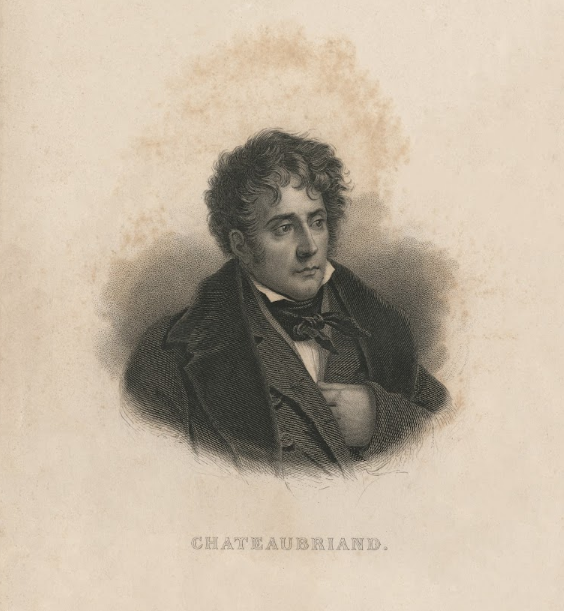François-René de Chateaubriand ( 1768-1848 )

François-Auguste-René, vicomte de Chateaubriand, was a French writer, statesman, and diplomat, born on September 4, 1768, in Saint-Malo, France. Descended from an old aristocratic family, Chateaubriand grew up in the family’s Château de Combourg. Distinguished as a pupil, he went on to study at the colleges of Dol, Rennes, and Dinan. In 1786 he enlisted in the French army as a secondary lieutenant, only to resign a few months later due to his father’s death. He settled in Paris, where he was promoted to the rank of captain. In the French capital, Chateaubriand associated with prominent writers and intellectuals, publishing his first verses in the Almanach des Muses in 1789.
After the outbreak of the French Revolution, he left France for the United States. He did not return until 1792, when he got married to Céleste Buisson de la Vigne. In the same year, he joined the Royalist émigrés’ army against the Revolution. After being wounded at the Siege of Thionville, he left France for London again. He lived in Britain for seven years in financial hardship and deprivation, teaching French and translating. During his stay in Britain, he published his first treatise, Essai sur les Révolutions.
He returned to France in 1800 after Napoleon’s amnesty. In 1802 he won fame with The Genius of Christianity, an apologia for the Catholic faith, which contributed to the revival of Catholicism in France. In 1803, attempting to reconnect France with the Catholic Church, Napoleon appointed Chateaubriand as secretary of the French diplomatic mission to the Holy See and then as plenipotentiary minister in Switzerland. Chateaubriand resigned in 1804, in dismay at the execution of the Duke of Enghien, a cousin of Louis XVI.
In 1806-1807, Chateaubriand travelled in the Mediterranean for several months, visiting the Peloponnese, Athens, the Cyclades, Izmir, Constantinople, Palestine, Egypt, Tunis, and Spain. The French author documented his travel impressions in his book Itinerary from Paris to Jerusalem, published in 1809. His sympathy for modern-day Greeks and his harsh criticism of Ottoman authoritarianism, both evident in his travelogue, had an impact on European opinion during the Napoleonic Wars, paving the way for a favourable reception of the Greek War to break out 12 years later.
Chateaubriand’s diplomatic career began after the defeat of Napoleon – against whom the French author had published in 1814 a pamphlet, De Buonaparte et des Bourbons. In 1815, after the restoration of the Bourbons, Chateaubriand became peer of France and state minister. However, he soon fell into disgrace due to his criticism of King Louis XVIII and joined the opposition, contributing to the conservative newspaper Le Conservateur. In 1821 he served as ambassador to Prussia and the following year to Britain; from 1822 to 1824, he was foreign minister. In 1824 he once again joined the opposition; he also contributed to the Journal des Débats.
Chateaubriand was an ardent supporter of the Greeks in the War of Independence from the very beginning. When it broke out, he joined the philhellenic movement, and in a new edition of his Itinerary added a “Note on Greece”, in which he advocated for the Greek cause. In 1828 he was appointed ambassador to the Holy See for one year. He left politics in 1830, refusing to recognise the French regime that emerged from the July Revolution, and devoted himself to writing until his death, on July 4, 1848, in Paris. He was buried, according to his will, on Grand Bé, a tidal island near Saint-Malo.





